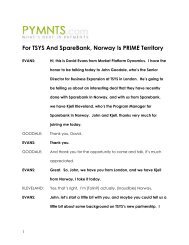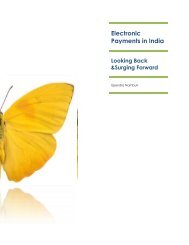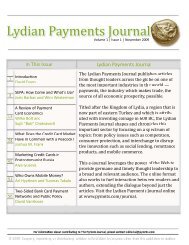Interchange Fees: The Economics and Regulations of What
Interchange Fees: The Economics and Regulations of What
Interchange Fees: The Economics and Regulations of What
- No tags were found...
Create successful ePaper yourself
Turn your PDF publications into a flip-book with our unique Google optimized e-Paper software.
38 INTERCHANGE FEESstriking that while the theoretical literature in economics describes a variety <strong>of</strong> possible marketfailures that might affect interchange rates, there is broad agreement that cost-based regulationis not an appropriate response to any <strong>of</strong> them. Again, the Fed Economists summarized this consensuswell:“[T]he determination <strong>of</strong> which costs should be included in a cost-based fee is necessarily arbitrary,<strong>and</strong> measuring those costs is nontrivial, particularly if frequent re-estimation <strong>of</strong> costs isnecessary. More importantly, the economic theory underlying the efficient interchange feeprovides no rationale for either a strictly cost-based interchange fee or an interchange fee <strong>of</strong>zero.” 13 (emphasis added)As Pr<strong>of</strong>essor Calvano makes clear in his accompanying submission, more recent studies haveonly strengthened this conclusion: in striking contrast to most regulatory environments, the literatureis unanimous that it is not efficient for interchange fees to be equal to any measure <strong>of</strong> anyentity’s marginal, incremental, or average cost. 14 <strong>The</strong> proposal to base regulation on cost alone inthis case is like a physician, unsure <strong>of</strong> the right diagnosis, nonetheless prescribing a remedy that themedical literature agrees is inappropriate for any plausible illness considered.C. Is the Regulation Likely to Make Consumers Better Off?Section 904 <strong>of</strong> the Electronic Fund Transfer Act requires the Board, to the extent practicable,“demonstrate that the consumer protections <strong>of</strong> the proposed regulations outweigh the compliancecosts imposed on consumers <strong>and</strong> financial institutions.” 15 Perhaps the most obvious <strong>and</strong> most seriousproblem with the proposals that were presented to the Board is that there was no finding thatthey would benefit consumers. In fact, the Board was informed by a Board staff economist that,“[O]verall it’s hard to anticipate what the overall [e]ffect on consumers will be.” 16<strong>The</strong> Board was told that consumers could pay higher fees for their checking accounts <strong>and</strong> forusing debit cards, that consumers might obtain benefits from lower prices at merchants, but that itwas not possible to predict whether consumers would, on balance, be better or worse <strong>of</strong>f as a result<strong>of</strong> the regulations. 17 In other words the staff felt it was possible that the proposed regulations wouldmake consumers worse <strong>of</strong>f. It is hard to imagine a physician recommending that a patient take aparticular medicine even though its effects are “hard to anticipate.”13<strong>The</strong> Fed Economists (2009), at p. 48. Also, see <strong>The</strong> Fed Economists (2009), at p. 62.14Emilo Calvano, “Note on the Economic <strong>The</strong>ory <strong>of</strong> <strong>Interchange</strong>,” Submission to the Board <strong>of</strong> Governors <strong>of</strong> the FederalReserve System, February 22, 2011, at pp. 4-8 (“Calvano Report”).1515 U.S.C. § 1693b(a) (3).16Board December 16, 2010 Open Meeting, at p. 11 <strong>of</strong> 28.17Ibid. Board economist, Mark Manuszak, stated, “[A]ny savings that consumers might realize at point <strong>of</strong> sale could be<strong>of</strong>fset by fee increases at their banks, as well as changes in terms that debit cardholders face for card use <strong>and</strong> depositaccounts. So, specifically, account holders at covered institutions may face higher fees for debit card use or additionalaccount fees, <strong>and</strong> they couldn’t foresee if less favorable terms for their debit -- for their deposit accounts <strong>and</strong> relatedservices.… [O]verall it’s hard to anticipate what the overall [e]ffect on consumers will be.”








